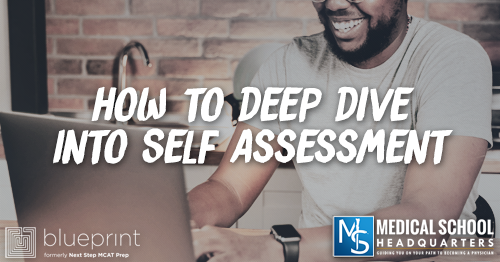Apple Podcasts | Google Podcasts
Session 244
We’re joined by Alex this week as we discuss how to manage test anxiety along with things that you can do to hopefully overcome it, or at least handle it on your test day.
Alex and I are psychiatrists. (I am a physician but not a psychiatrist.) And I had a psychiatrist on The Premed Years Podcast talking about testing anxiety back in Episode 337. So if you have severe test anxiety, go listen to that episode with Dr. David Pewter.
If you haven’t yet, be sure to check out Blueprint MCAT for more test prep resources. If you would like to follow along on YouTube, go to premed.tv.
Listen to this podcast episode with the player above, or keep reading for the highlights and takeaway points.
[02:20] How to Deal with Test Anxiety
Alex thinks everyone who approaches this test deals with some level of anxiety. It’s an almost inevitable human muscle response to something that is of high stakes and high pressure. However, for some people, this crosses over into clinical definitions of anxiety. Therefore, anxiety is something you should discuss with a trusted professional or physician.
That being said, performance comes with a certain level of anxiety that you need. This is anxiety in terms of the physiological responses where our cortisol increases. Our heart rate goes up a little bit or our blood vessels are dilating. That’s normal in response to some conflict that we are going to encounter.
[07:25] Understanding Our Working Memory
There’s also a large number of people who tied in negative self-talk and lack of confidence into test anxiety. Especially ESL students, they crush their science sections, and then really struggle in the CARS sections. Because they tell themselves the whole time they’re in the CARS section that they’re a slow reader or they’re not good at English.
“We only have a certain amount of space in our brains to hold information. And if you're filling that space with negative self-talk, you're not going to do well on CARS.”Click To TweetWe have this thing called the working memory. That if you’re filling your working memory with negative self-talk instead of the information you need to know to answer the questions, then you’re not going to do well on the exam. And that’s expected because you’ve been telling yourself the whole time that you’re going to do terrible, so it’s a self-fulfilling prophecy.
[09:38] Tips for Dealing with Stress and Internal Conflict
Alex explains many people perhaps approach their test anxiety as if it’s an immutable property of their brain. And so, for instance, you know you would really feel anxious during psych/social or CARS.
Alex advises taking a step back from that and be able to make a mental distinction between your anxiety being test-induced, or whether you have clinical anxiety. And once you’ve identified that it’s test-induced, then you could dig deeper into determining the causes of your anxiety. And to many people, they’re tying in their self-worth to the exam.
Something I’ve learned as a parent is to tell my kids not that they’re smart, but they’ve worked really hard to accomplish something. And so, now that they’ve internalized that they’re hard workers, and not that they’re smart, and when they have hiccups in the future, they won’t have that conflict of identity.
And so, when students are taking practice tests and they’re not happy with their scores, they automatically tell themselves that they’re dumb. And that internal conflict can be immensely stressful. And this is why a lot of students avoid taking diagnostic tests.
'You have to uncouple the sense that your intellectual and personal self-worth depends on doing well on this test.'Click To TweetSecondly, acknowledge that behind every MD matriculation lies a ton of practice tests, which were probably below what they actually got on test day. Know you’re going to be bad to start right. That’s just that’s how it works. And that’s okay. It’s difficult but it can be done.
[15:06] Other Sources of Anxiety
Another cause of anxiety among students is when their MCAT is in a couple of weeks and they’re still not where they want to be. They think the test date is when they’re supposed to take it, which means if they’re not ready by then, it’s a personal failure.
'Everyone's journey to this test is different. It takes everyone different amounts of time.'Click To TweetAlex says he has had students who have studied for this test for two years, as well as students who have crammed it in in six weeks. So you have to acknowledge that everyone’s journey to the test is different.
Another source of this anxiety is comparing yourself to others. Maybe you heard that your friend scored a 515 and they started studying two months after you. Therefore you must be a failure because they’re doing much better. And comparing yourself to others will just drain your energy.
[17:10] The Power of Positive Affirmations
Positive affirmations are helpful especially if you do them over a long period of time. If you repeat a positive thought, often enough in your mind, you’ll start to believe it. And you’ll start to break the pattern of negative thoughts that pull you into that anxious place.
Here are some positive affirmations that you could regularly recite:
- “My self-worth doesn’t depend on my MCAT score.”
- “I am smart, and I am accomplished outside of how the AAMC judges the MCAT.”
If you’re someone who struggles with pacing, you can try these affirmations:
- “If I spend enough time working on this skill, my timing will improve.”
- “I have the ability to improve with practice.”
And so, repeating statements that are true and that counteract the source of your anxiety can be immensely helpful.
[19:11] Building Confidence Through the Power Poses
There’s a TED talk by Amy Cuddy about building confidence and the physiological responses that come from the power poses. A power pose refers to standing in a position that makes you feel powerful. You’re putting yourself in a body position that feels strong, confident, and powerful.
Alex adds there’s psychological research that shows that how we carry ourselves actually has a synergistic impact on our mental posturing. He says you could try this one out but you might also find this is not for you. And that’s okay.
He clarifies that all of these strategies we’re going through to manage anxiety are just that – they are tools, and they may not work for your particular case.
Again, everyone is different. If you haven’t tried positive affirmations and power poses, then just give it a try.
[21:11] Practicing Self-Care to Prepare for Test Day
Our society tends to encourage people to view the mental and the physical as separate. But that doesn’t exist in real life.
People divorce mental performance from physical performance, but they are, in fact, intimately related.
“Mental performance begins with taking care of your physical needs. You cannot perform at your absolute mental peak on the MCAT without also taking care of your physical needs first.”Click To TweetHence, at its most basic, get enough sleep, not just the night before your MCAT. Drink enough water. Exercise.
If you neglect your physical needs and you don’t treat your body like a finely tuned instrument that the MCAT requires, then ultimately, you’re not going to perform at your peak.
So everyone should start now! Then maintaining that through medical school and through residency is very important. It’s for your health, for longevity, and it helps you with taking the tests as well.
[24:40] Strategies on MCAT Test Day
It’s a brand new environment with the whole process of checking in and getting a locker and putting your stuff away and going to the computer. The test anxiety is potentially going to kick in Fast and Furious.
Ultimately, the test day environment is different from your practice tests. And the source of that anxiety is all of those tiny differences between what you’ve been used to and what the test center is.
Therefore, the key is to minimize those total number of differences. That starts by making your practice as test-like, as possible. Take it using the same timing as the actual test. Eat similar food and at the same time. Wear a mask for the whole test.
Then once we get to test day itself, you know, it’s worth acknowledging that a little bit of anxiety is completely normal and unavoidable.
But ultimately, be confident in your ability to manage that healthfully to treat it as eustress rather than distress. Allow it to push your performance to its highest possible level, without pushing over the edge of that curve towards maladaptation.
Physiologically, there’s not a lot of difference between stress and excitement. And a little bit of a mindset shift of “I’m stressed and I’m anxious” to “I’m excited. This is a test that is going to show how hard I’ve been working. And it’s going to open a lot of doors for me.”
'That little bit of a mindset shift of I'm nervous to I'm excited may make all the difference in the world.'Click To TweetSo be prepared. Trust yourself. Have the confidence that you have worked hard to get what you want. And understand that you’re going to have some jitters. And that’s okay.
[30:22] Final Thoughts
Alex firmly believes that you should be walking into the test day with no less than all of the AAMC full-lengths completed. As these are actually very strong predictors of your test day score.
'The vast majority of people who take the MCAT score within a couple of points in either direction of the average of those four graded full-lengths.'Click To TweetAnd so, no matter how hard the test today feels because it’s scaled and equated, be confident that your score will probably be within about two points of whatever your average is. The actual uncertainty that exists in your score range is probably narrower than you may think.
Links:
The Premed Years Podcast Episode 337: How to Overcome Test Anxiety and Take Back Control
Amy Cuddy’s TED Talk: Your body language may shape who you are
SEARCH SITE
SEARCH SITE
LISTEN FOR FREE












